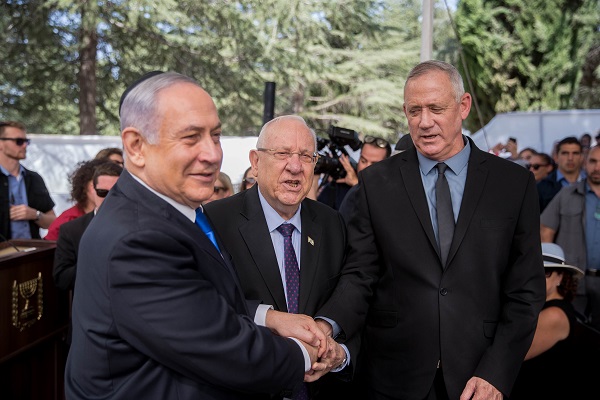
Jerusalem, The United Arab List, the third most powerful political group in Israel, having won 13 seats in the recent elections presented a series of demands to centrist leader Benny Gantz in exchange for backing his candidacy for Prime Minister.
Consultations to form a new government will be ongoing on Sunday with the sponsorship of the President of Israel, Reuven Rivlin, Efe news reported.
The leaders of the Arab alliance are yet to make a final decision on which candidate they will ultimately support, as they are pending a reply on their coalition request from Gantz’s Blue and White alliance.
Depending on what Gantz’s side says, the Arab list is to consider its final stance in a last-minute meeting which will take place just before the consultation with Rivlin, Aida Touma-Suleiman, an Arab list parliamentarian, told Efe.
The Arab alliance represents the Arab minority in Israel, which is estimated to make up around 20 per cent of the total Israeli population.
Among their demands, Arab list leaders demanded a freeze to home demolitions in the so-called “unrecognized Arab villages” and to form an investigation team to inspect the conflicts and issues of those villages, according to the Times of Israel’s digital edition.
The list also requested effective governmental measures to battle violence within the Arab sector, re-initiating the peace process with the Palestinian National Authority.
They also called for revoking the controversial nation-state law that defines Israel as a Jewish state, as that law treats Arabs as second-class citizens and only recognizes the capacity of self-determination to the Jews.
If the United Arab List eventually supports Gantz, the group will break with their traditional stance and abstain from taking sides in Israeli politics and this will be the first time since 1992 that they would back an Israeli candidate as prime minister.
The last time the United Arab List recommended a candidate was more than 25 years ago when they supported Labour leader Isaac Rabin.
The Israel political scene remains marred by uncertainty after the 17 September election in which the Blue and White alliance won 33 seats, outdoing the right-wing party of Likud, presided by the current acting PM, Benjamin Netanyahu, who had to settle for 31 seats.
However, neither Gantz nor Netanyahu managed to form a majority government, which has led to complications and the Israeli President Rivlin having to be involved in deciding who will be Prime Minister.
This situation might continue, as neither of the political alliances has enough seats to reach the magic 61 seat threshold.
The coalition between right-wing parties and their religious allies, which is led by Netanyahu, currently has 55 seats in the Knesset, while Gantz’s alliance is set to reach a maximum of 57 seats if Arab Israeli parties support him.
Rivlin, who has called on all parties to create a national unity government, will attempt to clear the situation through the two-day consultations he will carry out over Sunday and Monday.
The President will announce the chosen candidate next Wednesday, after receiving the official and final results of Tuesday’s elections.
The key factor in this puzzle will be Avigdor Lieberman’s right-wing party, Yisrael Beiteinu, which means “Israel Our Home,” as its eight seats could shift the balance towards Gantz or Netanyahu.
On Thursday, Netanyahu has invited his rival Gantz to form a unity government to end the political deadlock that emerged from repeat elections.
Yisrael Beiteinu is yet to decide who will be its candidate for the PM office, and they will be discussing the matter this afternoon in a party meeting before party leaders gather with Rivlin, a spokesperson told Efe.
Local media report that Lieberman, who is considered to be a force for secularism in Israel, will support neither Gantz nor Netanyahu, which will extend the political deadlock even further.









